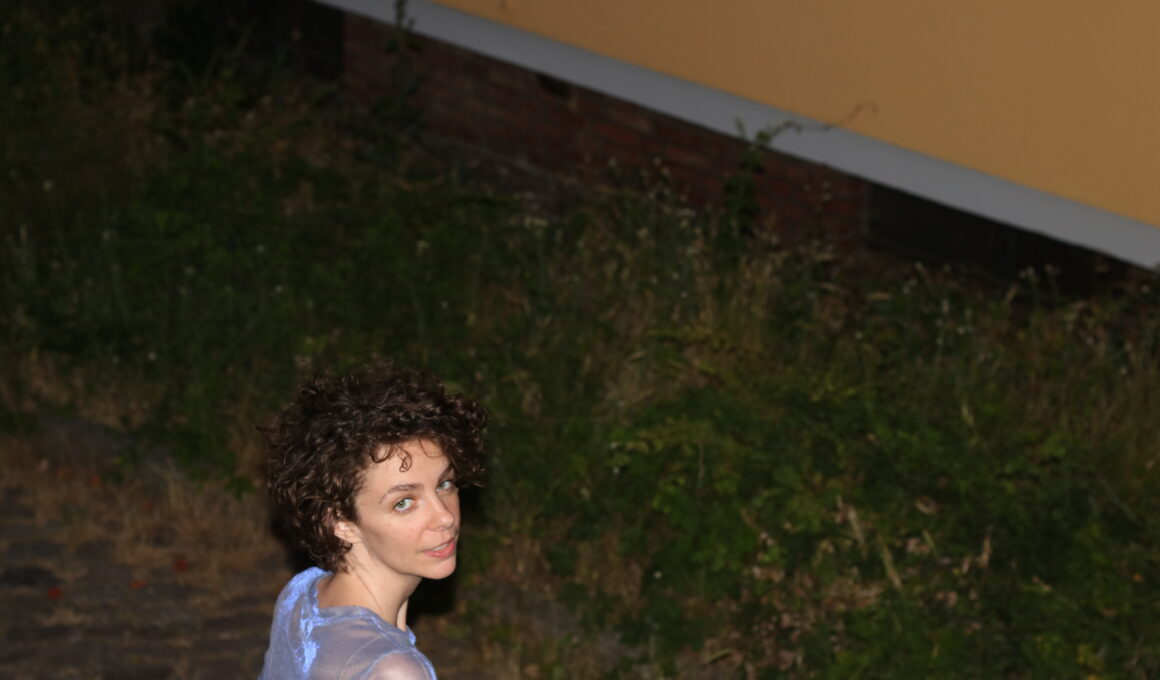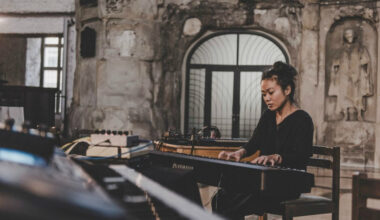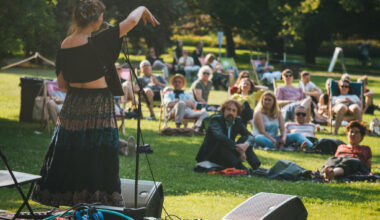Mars Dietz is an artist, composer and DJ from Brooklyn, living in Berlin, Germany. Their hybrid background involves club DJing, writing, multi-channel audio installation, and live performance in an intensively research-driven practice bent on historical analysis. Mars frequently collaborates with Berlin-based choreographers as a sound designer and occasional co-author. As DJ Sapphic Faggot, Mars performs at the monthly party BODYSNATCH in Berlin, where they are a resident and core crew member. They also sporadically create and release music as a singer-songwriter.
This summer, Mars is performing their latest solo project “Plague!” in the context of artist and curator Gretchen Blegen’s three-day sonic space Beyond Beyond. Plague! is a live set and EP that works with vocal recordings of the late AIDS activist and playwright Larry Kramer, carrying his ever-prescient message from one pandemic to another.
FACTS
1. Visibility is a trap
2. There is no opposite of love
3. The past is yet to come
QUESTIONS
1. What is the biggest inspiration for your music?
The speech act is the source of both my music and my sound art – it is not only about having something to say, or even about the style in which it is said, but about the sovereignty of language itself to ring out its own truths. Words have a shattering clarity. I pursue sounds that do this, or make sound environments that support speech that does this.
With this latest project, “Plague!,” which I will perform in Gretchen Blegen’s Beyond Beyond in July, I took some time with the voice of the late Larry Kramer. He was an AIDS activist, playwright and author who was well known to be quite a polemicist. One of the things I was struck by was how for a time in his career he was also stigmatized by other gay activists around him for his controversial take on unprotected sex as ethically indefensible in the face of the AIDS crisis. I hadn’t known until recently how critical he was of his queer bretheren. He possessed what would come across as a terrible pessimism, if it were not so clear that his voice carried a militant hope, and a powerful sense of grief. Grief, which is the well of love. I’m very drawn to the way he wielded polemics in his life. I do not agree with everything Larry Kramer said, but I admire how he dared to speak, indiscriminately and loudly. To me, Larry poses the uncomfortable question: what is nonviolence? What is the scope of nonviolence? What do we owe each other, by virtue of our irrevocable interdependence, our porosity? I have asked myself these questions every single day since this latest pandemic began.
2. How and when did you get into making music?
There are a few different ways to tell that story. I’ve played guitar and written songs since I was 15. But it wasn’t until I was in my 20’s, when I was working in the conceptual and visual art frame, that I started to do sound art. It was also around then that I started to DJ as Sapphic Faggot. Those two practices sort of merged in a way, because I used DJing within my sound installations that were collage or sample-based, but before long I started creating my own original instrumentations and recordings. So it was through all those angles that I then returned to the songs I wrote on guitar in my teens. I started singing not just for myself but in front of others or in recordings. I am very much still discovering how all the chronologies of sound & music in my life converge and diverge, depending on their purpose and context.
3. What are 5 of your favourite albums of all time?
1. Total Freedom – The Banging Bells of Hell Mixtape
2. Lauryn Hill – The Miseducation of Lauryn Hill
3. Owen Pallett, who was then releasing as Final Fantasy – He Poos Clouds
4. The Fiery Furnaces – Gallowsbird’s Bark
5. M.I.A. – VICKI LEEKX MIXTAPE
4. What do you associate with Berlin?
This is a funny question, because when I first arrived in Berlin it was somewhat incidental. I was meant to be helping out in a garden in Brandenburg and to get there I passed through the city. Little did I know that garden would be on an arts center where I wound up making connections that would change my life and eventually lead me to move here. I’ve often thought about the overrepresentation of places like Paris, or Los Angeles, or my hometown of Brooklyn, and how images of those cities get interspersed with lived experiences both before and during a real encounter with them. When I came to Berlin for the first time, I had somehow never been exposed to images of the city, though I know this too is an overrepresented place. For example I did not even know Berlin was famous for club culture. Its been a pleasure and a challenge to get to know this city for itself, without a plan for how it should serve my narrative identity. In that sense I don’t really move through the city via associations. But over the many years I’ve been in and out of this place I’ve come to associate Berlin, and especially the smell of the air, with a certain physical feeling of home.
5. What’s your favourite place in your town?
In my town, my favorite place is the Atlantic ocean. In this town, my favorite places are the lawn in front of Silent Green, standing behind the DJ booth at Monarch, or at my desk in front of my studio monitors.
6. If there was no music in the world, what would you do instead?
I would be a writer.
7. What was the last record/music you bought?
Rhodri Davies – Telyn Rawn
8. Who would you most like to collaborate with?
I have been extremely grateful to collaborate with many wonderful people in many different projects. My biggest wish is actually to go deeper with those I’ve already connected with. I think about Carmen Denison, an incredible artist, educator and activist in Portland, Oregon, who is also an old friend. It would be amazing to reconnect and create something new together. What a generous and salient mind.
9. What was your best gig (as performer or spectator)?
I had the fortune of being a spectator to choreographer keyon gaskin’s performance work “it’s not a thing” many years ago. I think keyon is a truly brilliant artist, someone who works deeply with space, time and presence like nobody else. Presence, deftness, power.
10. How important is technology to your creative process?
I am very, very obsessed with technology. In my sound installations especially, technology is a huge source of inspiration. At the moment I want to get rid of some hardware, but I still love to browse Max for Live devices on the community library and I read music technology blogs and magazines (CDM, SOS, Synthtopia) daily. Regularly poring over music technology literature is how I became a self-taught electronic musician.
11. Do you have siblings and how do they feel about your career/art?
I am in the process of building a chosen family within which there is a lot of mutual support.
Photo © Jule Flierl


